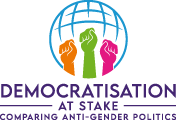Working Group 3
Rethinking activism and forms of oppositions with a focus on unexpected allies
Working Group 3 (WG3) delves into the complex terrain of activism and opposition against anti-gender politics, particularly emphasizing the emergence of unexpected alliances. The group's focus, encapsulated in the title "Rethinking Activism and Forms of Opposition with a Focus on Unexpected Allies," asks crucial questions about the forms of opposition that are arising in response to anti-gender movements and their effectiveness. Through this lens, WG3 explores how feminist, queer, and even non-feminist/non-queer actors are mobilizing to confront anti-gender politics in diverse ways.
WG3 investigates several key aspects of these opposition movements. One central question of the inquiry is what kinds of feminist, queer and non-feminist/non-queer opposition are forming against anti-gender politics. The group seeks to identify and understand the diversity of these oppositions, recognizing that resistance often comes from unexpected places and in various forms. Beyond identification, the group also examines how effective these oppositions are in disrupting and challenging anti-gender narratives and policies, considering both immediate and long-term impacts on political and social structures.
In exploring the scope and potential of these movements. The potential for expanding coalitions and the kind of coalition partners that are emerging are also topics that WG3 asks about. This question highlights the importance of broadening alliances across different sectors of society, from grassroots organizations to institutional players, and explores how these partnerships can strengthen opposition efforts.
Additionally, WG3 is keen to understand the impact that these diverse opposition groups, strategies and coalitions have on wider political regimes, and their potential to influence broader political dynamics at local, national and international levels.
Another critical area of inquiry is the role of economic actors in shaping the opposition landscape. Specifically, WG3 seeks to explore the role of economic actors, including corporations and businesses, in forming pro-democratic coalitions. The involvement of these actors can have significant implications for the resources available to resistance movements and their ability to influence policy and public opinion.
Finally, WG3 examines the role of local governments in this struggle and explores whether attitudes towards (anti-)gender politics differ at various levels of state hierarchies. This inquiry is crucial for understanding how political resistance plays out differently at various levels of governance, and the role local governments play in either shaping or supporting anti-gender movements.
Through this multifaceted exploration, WG3 sheds light on the evolving strategies of opposition to anti-gender politics and the complex networks of power, solidarity and resistance emerging in the process.
Leadership positions
WG3 Leader: Dr. Veronika Valkovicova
WG3 Co-Leader: Dr. Magdalena Grabowska

